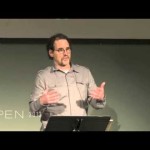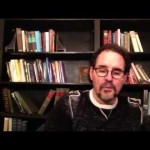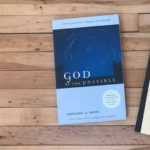We run our website the way we wished the whole internet worked: we provide high quality original content with no ads. We are funded solely by your direct support. Please consider supporting this project.

Why We Can’t Know Why
Various fields of science have taught us that the slightest variation in a sufficiently complex process at one point may cause remarkable variations in that process at another point. The flap of a butterfly wing in one part of the globe can be, under the right conditions, the decisive variable that brings about a hurricane in another part of the globe several months later. (This is called “the butterfly effect.”) To exhaustively explain why a hurricane (or any weather pattern, for that matter) occurs when and where it does, we’d have to know every detail about the past history of the earth—including every flap of every butterfly wing! Of course, we can’t ever approximate this kind of knowledge, which is why weather forecasting will always involve a significant degree of guesswork.
By analogy, this insight may be applied to free decisions. Because love requires choice, humans and angels have the power to affect others for better or worse. Indeed, every decision we make affects other agents in some measure. Sometimes the short-term effects of our choices are apparent, as in the way the decisions of parents immediately affect their children or the way decisions of leaders immediately affect their subjects.
The long-term effects of our decisions are not always obvious, however. They are like ripples created by a rock thrown into a pond. Ripples endure long after the initial splash, and they interact with other ripples (the consequences of other decisions) in ways we could never have anticipated. And in certain circumstances, they may have a “butterfly effect.” They may be the decisive variable that produces significant changes in the pond.
We might think of the overall state of the cosmos at any given moment as the total pattern of ripples made by a constant stream of rocks thrown into a pond. Each ripple interacts with other ripples, creating interference patterns. Every event and every decision of history creates such an interference pattern. This intersection of multitudes of decisions contributes to all subsequent interference patterns.
Each person influences history by using his or her morally responsible say-so, creating ripples that affect other agents. And as the originators and ultimate explanation for their own decisions, individuals bear primary responsibility for the ripples they create. Yet each individual is also influenced by the whole. Decisions others have made affect their lives, and these people were themselves influences by decisions others made.
From this it should be clear that to explain in any exhaustive sense why a particular event took place just the way it did, we would have to know the entire history of the universe. Had any agent, angelic or human, made a different decision, the world would be a different place. But we can never know more than an infinitesimally small fraction of these previous decisions, let alone why these agents chose the way they did.
The question of “Why did this happen to me?” is unanswerable. It’s a mystery. But this mystery is not about God’s will or character (as I argued here); it’s a mystery about the vastness and complexity of creation. Every particular thing we think we understand in creation is engulfed in an infinite sea of mystery we can’t understand. Anything we know about a particular aspect of any particular event that happens the way it does is immersed in endless human decisions, angelic decisions, and various “flaps of butterfly wings” that are too vast and complex to get our minds around.
This is the case not because we are fallen. It’s simply because we are finite. This is why our first and foremost job description involves very little knowing but a great deal of loving. Our limited domain of responsibility is primarily to love God and others as we are filled with God’s love.
—Adapted from Is God to Blame? pages 96-104.
Photo credit: Noah Silliman via Unsplash
Category: General
Tags: Chaos Theory, Complexity, Open Theism, Problem of Evil
Related Reading

Open2013 Speakers (Video)
Here’s all of the videos of the speakers and their Q&A’s from Open2013. Unfortunately, there was a mix-up and we didn’t get Jessica Kelley’s presentation taped. We’re working to get her to speak again so we can get that to you. Thanks for posting this on youtube T. C.! And now, without further ado… Greg…

Free Will: Is it a coherent concept?
Greg is going to be spending the next several blogs talking about the idea of free will. In this first reflection, he discusses whether it is coherent to speak of a decision that is not determined or exhaustively caused.

Why? The Question That Cannot Be Answered
Yesterday Greg sent out the following flurry of tweets: To provide some background to these tweets, the following illustration will prove helpful: They mystery of evil and an eight-second interval Let’s assume that there is an eight-second interval between two cars. Now let’s try to explain why there is this eight-second interval at this particular…

Paradigm Shift Questions
A couple that was recently introduced to ReKnew and several of my books recently wrote to tell me that they are in the process of embracing the warfare worldview along with the open view of the future. They said that they “realize that these things aren’t minor adjustments but are rather all-encompassing paradigm shifts in…

Podcast: The Making of God of the Possible
Greg talks about making his book “God of the Possible,” then offers his initial thoughts on Thomas Oord’s book “God Can’t.” http://traffic.libsyn.com/askgregboyd/Episode_0468.mp3

How do you respond to John 21:18–19?
Jesus says to Peter, “‘[W]hen you were younger, you used to fasten your own belt and to go wherever you wished. But when you grow old, you will stretch out your hands, and someone else will fasten a belt around you and take you where you do not wish to go.’ (He said this to…
